Operation PITTING is the name for the military support to the evacuation of British Nationals and former British staff eligible for relocation under the Afghan Relocation and Assistance Policy (ARAP).
British forces from 16 Air Assault Brigade arrived in the Afghan capital to assist in evacuating British nationals and entitled persons amidst the worsening security situation there.
According to the MOD, the operation will consist of 600 military personnel, some of which have already deployed, with more deploying within days from the British Army's high-readiness 16 Air Assault Brigade. The operation will be commanded from Permanent Joint Headquarters in Northwood, London. The troops will provide force protection and logistical support, with the Royal Air Force providing aircraft where necessary. The United States is carrying out a similar operation, named Operation Allies Refuge.
Members of the Armed Forces who were deployed in August 2021 to support the evacuation from Afghanistan will receive medallic recognition for their contribution. This was the largest humanitarian aid operation in over 70 years.
Personnel from across the Royal Navy, British Army and Royal Air Force will receive the Operational Service Medal (OSM) Afghanistan, with its own distinctive clasp, for their involvement in Operation Pitting – an evacuation effort to airlift thousands of Afghans and British nationals from Afghanistan as the Taliban seized control of the country.
Prime Minister Boris Johnson said:
“I’m delighted that Her Majesty The Queen has given permission for a special medal to be awarded to all those who deployed to Kabul, to honour their heroism in the face of extreme adversity.
“Operation PITTING will go down as one of the great achievements of our UK Armed Services and their civilian counterparts in the post-war era. The whole country can be immensely proud of their tireless work to bring men, women and children to safety. They represent the very best of us.”
Commanded from the UK’s Permanent Joint Headquarters in Northwood, Operation Pitting began on 13 August 2021 and assisted those eligible for relocation to the UK under the Afghan Relocation and Assistance Policy from Afghanistan.
During this period of humanitarian crisis, the military provided food and water, clothing, medical supplies and hygiene products for evacuees and policed the airport alongside multiple forces from across the world. 16 Air Assault Brigade put 600 soldiers on the ground to provide force protection and logistical support to the vast operation at Kabul Airport.
The RAF also completed a record-breaking flight with a passenger number of 439 on a Globemaster.
The operation ended on 28 August 2021 and resulted in the safe evacuation of over 15,000 people on 100 flights, from at least 38 different nations. This was a key part of a multi-national effort which secured the evacuation of over 122,000 people.
Defence Secretary Ben Wallace said:
“Last August, the Armed Forces demonstrated true heroism, bravery and dedication by supporting Operation Pitting – a monumental effort to airlift over 15,000 vulnerable Afghans and British nationals from Afghanistan during a rapidly deteriorating humanitarian crisis.
“As the security situation worsened by the hour, our service men and women stepped up and delivered the largest British evacuation since the Second World War. They will rightly receive medallic recognition for their efforts.
“I would like to thank them, and all our service personnel, on behalf of the public and UK Government for safely evacuating endangered Afghans through some of the most desperate scenes imaginable. You have done us all proud.
“Following approval from Her Majesty The Queen, they will now receive the medallic recognition their efforts deserve.”
The medal
The medal is the existing OSM Afghanistan, but with an 'OPERATION PITTING' clasp. Those who already have the OSM Afghanistan with the 'AFGHANISTAN' clasp will receive the new clasp to affix to the ribbon. The medal is silver and circular in shape.
The obverse shows the crowned effigy of Elizabeth II with the inscription ELIZABETH II DEI GRATIA REGINA FID. DEF.
The reverse bears the Union Flag, surrounded by the inscription FOR OPERATIONAL SERVICE and the four major points of the compass with, between the points, four Coronets: Royal (top left), Naval (Navy, top right), Mural (Army, bottom left), and Astral (Royal Air Force, bottom right).
Ribbon: The ribbon consists of a broad central red stripe, flanked each side by a stripe of navy blue and one of light blue, to represent the three services, with an outer stripe of light brown, to represent the Afghan landscape.
Clasp: OPERATION PITTING clasp.
Airborne soldiers were presented with medals in recognition of their efforts during the evacuation of Kabul.
Medal parades were held by Colchester-based 16 Air Assault Brigade Combat Team’s units to mark their service on Operation Pitting, the mission to evacuate British people, entitled Afghans and civilians from partner nations as the Taliban took control of Afghanistan in August 2021.
Date:
24 June 2022
Reference:
20220622-PITTING_OSM-MediaO-O
Airborne soldiers presented Afghanistan medals
Airborne soldiers have been presented with medals in recognition of their efforts during the evacuation of Kabul.
Medal parades have been held by 16 Air Assault Brigade Combat Team’s units to mark their service on Operation Pitting, the mission to evacuate British people, entitled Afghans and civilians from partner nations as the Taliban took control of Afghanistan in August 2021.
Soldiers on their first deployment were presented the Afghanistan Operational Service Medal with an Op PITTING clasp, while soldiers who had previously served in the country and already received the OSM were given the clasp.
Private Barry Wallace, of Colchester-based 2nd Battalion The Parachute Regiment, said: “The way I see the medal is that it represents over 15,000 people that we rescued from Afghanistan. To receive it shows that we all did an important job to a very high standard, and I'm hugely proud of that."
“We were rotating through stations taking evacuees on the journey from entering the airport to getting on a plane out. So, one day I'd be working crowd control on the front gate and the next helping process evacuees’ paperwork and baggage. The conditions were incredibly hard, it was really hot and we were working with people who were in a really desperate situation".
The 32-year-old from Bridgend in South Wales joined the Army at 29, wanting a fresh challenge in his life after working as a chef for 16 years.
Private Sophie Robertson, a clerk with Woodbridge-based 23 Parachute Engineer Regiment, was driving home to Cupar in Scotland for summer leave when she found out she was deploying.
“I’d driven 400 miles from the barracks in Suffolk and was 100 miles away from home when the phone rang,” the 26-year-old said. “My sergeant told me to get home, sleep and get back on the road the next morning – two days later I was in Kabul.
“I was part of a team of female soldiers searching women and children, because the cultural sensitivities in Afghanistan meant that men couldn't do that job. We were incredibly busy, and it was heartbreaking work – people were fleeing with only what they could carry and pleading with us to help relatives that they were having to leave behind. When I first got back, I struggled with that but now I look back and see that it was a big achievement to have got so many people out."
“It means a lot to receive a medal – my first one – and I’m really happy that what we did is being recognised.”
In the two-week mission some 750 troops from 16 Air Asslt BCT, the British Army’s global response force, provided security and logistic support to the evacuation, with most of the soldiers coming back from their summer leave at short notice to deploy.
Working alongside the Joint Force Headquarters and in partnership with the Royal Air Force, the Foreign Commonwealth and Development Office and UK Border Force, more than 15,000 people were flown out. While in Kabul, the troops distributed 250,000 litres of bottled water, 25,000 bottles of baby formula and 9,000 nappies to the crowds of people waiting to be evacuated.

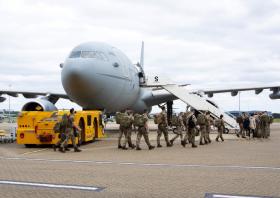
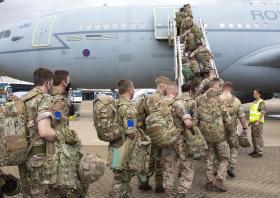
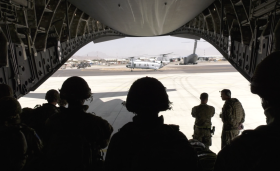
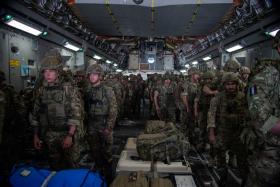
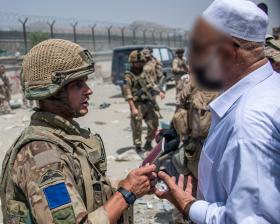
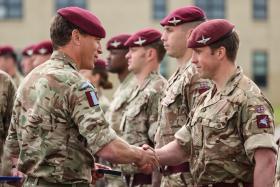
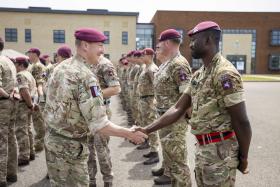
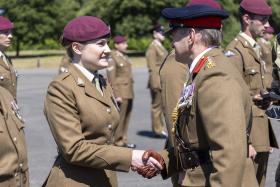
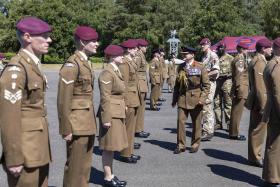
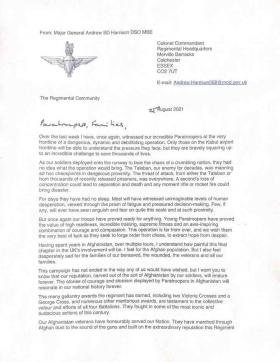
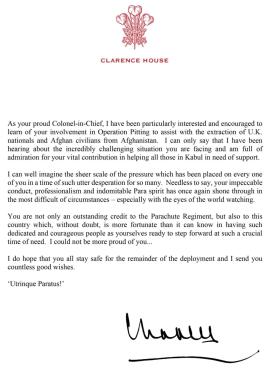
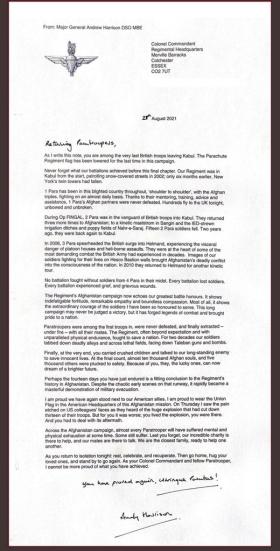
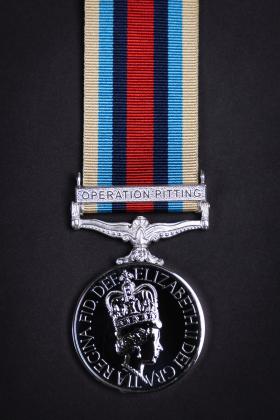
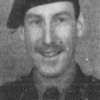
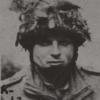
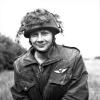
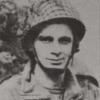
Latest Comments
There are currently no comments for this content.
Add Comment
In order to add comments you must be registered with ParaData.
If you are currently a ParaData member please login.
If you are not currently a ParaData member but wish to get involved please register.